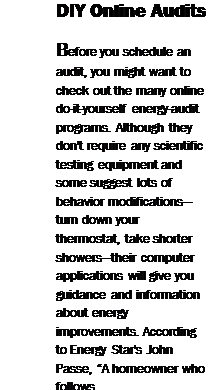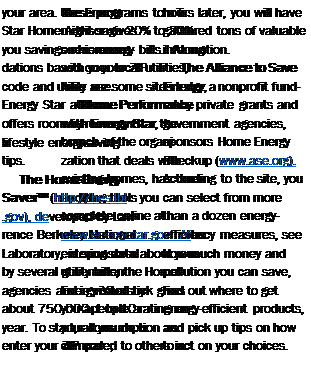Costs and Reports Vary
Whether a basic inspection or an in-depth scientific test, an auditor’s findings will likely be output from software that not only takes into account the physical data about the structure but also data about utility bills, the local climate, and, possibly, comparative information from other houses.
A CMC-trained auditor will generate a report about the existing house’s needed improvements, including a cost-benefit analysis and payback time in years. CMC doesn’t control what its inspectors charge, but Luxton says audits cost from $200 to $400, depending on the size of the house.
RESNET auditors are licensed to use company software that produces a HERS-index report. An audit with a HERS report (report fees can run around $150) costs from $1,000 to $1,500. While BPI doesn’t supply its own software, there are independent programs available that auditors can choose.
An audit from BPI-accredited TerraLogos® in Baltimore costs $495, and though it is thorough in its assessment of and recommendations for the house’s existing systems, it does not predict energy savings if the suggested upgrades are carried out.
On the other end of the scale is a soup – to-nuts audit done by a company such as Steven Winter Associates. Along with a basic inspection of a house up to 4,000 sq. ft., which includes no scientific testing, the a-la-carte audit menu could include a blower-door test, a duct-leakage test,

 |
appliance-combustion testing, infrared – imaging, energy-modeling, and a HERS rating. All this adds up to an audit that costs upward of $2,000.
The business of energy-auditing is getting huge. "It’s at a tipping point," says Courtney Moriarta, senior engineer at Steven Winter Associates. "Not only do homeowners think it’s a cool thing to do, but it’s also being driven more and more by energy-efficient mortgages and potential tax credits." Both Massachusetts and California are working on legislation that will require house sellers to divulge energy-audit information to prospective buyers.
Also on the horizon is a joint energyauditing standard between RESNET and BPI (which could be adopted by Energy Star, too). Currently in draft form and open to
public comment, the new standard is intended to clear up confusion among homeowners, but the reciprocity between the two organizations will also help auditors, many of whom have previously felt the need to get accreditation from both nonprofit groups. Steve Baden, executive director of RESNET, says that the standard will recognize the efficacy of all types of energy audits and auditors from "the DIY type to the guy with the clipboard and flashlight to the guy who also uses a blower door and an infrared camera."
Jefferson Kolle is a former editor at Fine Homebuilding.






Leave a reply